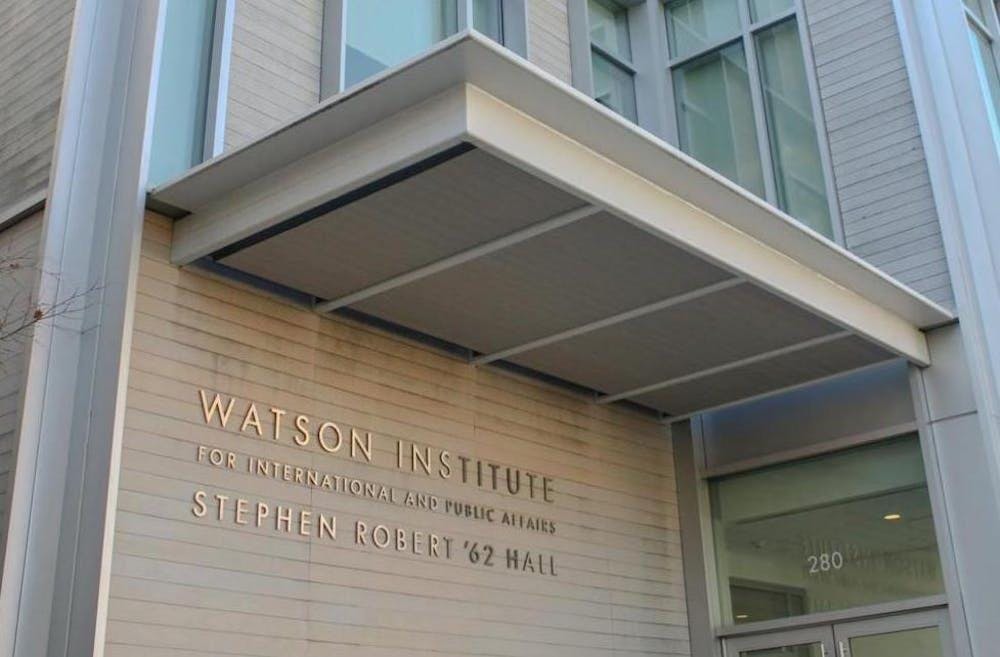Faculty approved a motion to convert the Watson Institute for International and Public Affairs into a school at a Tuesday meeting, with 72% voting in favor. Pending approval by the Brown Corporation, the school will be officially established on July 1, 2025.
The next Corporation meeting is scheduled for May. Agendas for the Corporation meetings are not made public prior to convening.
The vote came after a comment period, which included a town hall, for faculty to share thoughts and concerns about the establishment of the new school. The Academic Priorities Committee unanimously recommended and endorsed the school’s establishment, following a discussion of the motion in March’s faculty meeting.
The Faculty Executive Committee also voted prior to Tuesday’s meeting, approving the establishment of the school, but not unanimously. Steven Sloman, chair of the FEC and professor of cognitive, linguistic and psychological sciences, stated that the committee was cautious because of concerns that resources may be diverted from existing departments for the new school.
“This is a real concern because some departments already feel like they operate within the shadow of the Watson Institute,” Sloman said. “The University needs to clarify and be transparent about its priorities,” he added.
Provost Francis Doyle III addressed this worry at the meeting. “I can say with complete confidence that there will not be a division of resources away from other units to the Watson,” he said. “The Watson has a very robust budget.”
Doyle also assured that other concerns previously raised by faculty — including operational issues, cross-listed courses, teaching responsibilities and voting practices — “can be clarified with consultation with the Watson leadership over the coming planning year.”
The FEC was also concerned about a “lack of clarity in the school’s intellectual mission,” according to Sloman. “What new intellectual program will the School bring to Brown?” he asked. “The proposal focuses on Brown’s interdisciplinary character, but Brown, we believe, is unique in more ways than being interdisciplinary.”
Watson Director Edward Steinfeld, whose term ends June 30, stated at the meeting that the center’s mission is to combine deep area expertise with more practical knowledge about policy. “We’re coupling those in courses that emphasize experiential learning,” he said.
According to Doyle, “80% of the written comments we received were quite favorable,” with faculty expressing their “excitement about the vision for the school” and “praise for the multidisciplinary ethos of the Watson.”
At Tuesday’s meeting, faculty continued their discussion of the school’s creation with mixed responses.
Wendy Schiller, professor of political science and upcoming interim director of the Watson, said she hopes the new school will be open to the entire Brown community, including “faculty, graduate students, and undergraduates who may not have always felt there was a place for them or that they could benefit from all the Watson will bring.”
Schiller also noted that the increased infrastructure of converting the Watson into a school will advance foundation support for Brown faculty research and grant applications.
Steinfeld spoke about his hope for the school to issue masters level certificates for students in other Brown masters programs who may want to receive certification in additional fields, such as policy advocacy or humanitarian relief.
Most of the faculty who spoke in favor of the school’s creation at Tuesday’s meeting were Watson-affiliated.
Kevin Quashie, a professor of English, raised the concern that some departments were being overlooked and that there are “fewer robust opportunities through centers or institutes or schools” for the humanities.
Kristina Mendicino, the chair of German studies and vice chair of the FEC, expressed similar concerns, saying that she worries that the proposal “indicates a certain direction that the University is taking towards building these larger units, schools, centers and institutes when departments in the humanities that may or may not connect to them are struggling to have enough resources to thrive.”
Doyle assured that he and President Christina Paxson P’19 P’MD’20 have “looked very carefully at ensuring that departments weren’t going to be hollowed out” with the school’s creation.
“I think this is an opportunity to reshape what we’re doing and reshape some of the centers to be perhaps more humanities-facing than they have been,” Schiller added, emphasizing that she wants to “talk to everybody” and create the infrastructure that allows the School to be institutionally inclusive.
“We believe that a future school must rely on strong departments, but the departments will benefit from having a strong school,” Doyle said, noting recruitment benefits for both faculty and students. “It’s a beautiful symbiotic relationship.”

Cate Latimer is the editor-in-chief and president of The Herald's 136th editorial board. She is from Portland, OR, and studies English on the nonfiction track. She previously served as a University News editor covering faculty and University Hall and higher education. In her free time, you can find her playing ultimate frisbee or rewatching episodes of Parks and Rec.





